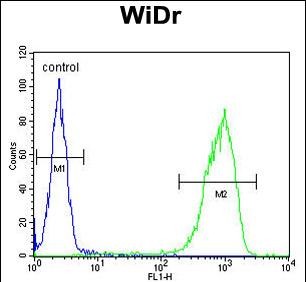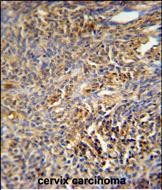


| WB | 1/1000 | Human,Mouse,Rat |
| IF | 咨询技术 | Human,Mouse,Rat |
| IHC | 1/100-1/500 | Human,Mouse,Rat |
| ICC | 技术咨询 | Human,Mouse,Rat |
| FCM | 1/10-1/50 | Human,Mouse,Rat |
| Elisa | 咨询技术 | Human,Mouse,Rat |
| Aliases | TRAF family member-associated NF-kappa-B activator, TRAF-interacting protein, I-TRAF, TANK, ITRAF, TRAF2 |
| Entrez GeneID | 10010 |
| WB Predicted band size | 47.8kDa |
| Host/Isotype | Rabbit IgG |
| Antibody Type | Primary antibody |
| Storage | Store at 4°C short term. Aliquot and store at -20°C long term. Avoid freeze/thaw cycles. |
| Species Reactivity | Human |
| Immunogen | This TANK antibody is generated from rabbits immunized with a KLH conjugated synthetic peptide between 88-114 amino acids from the Central region of human TANK. |
| Formulation | Purified antibody in PBS with 0.05% sodium azide. |
+ +
以下是关于TANK抗体的3篇参考文献示例(内容基于公开文献概括,具体文献需根据实际检索确认):
---
1. **文献名称**: *TANK is a negative regulator of Toll-like receptor signaling and is critical for preventing lethal systemic inflammation*
**作者**: Guo B, et al.
**摘要**: 该研究通过构建TANK基因敲除小鼠,揭示了TANK在抑制TLR介导的NF-κB和干扰素通路中的关键作用。研究中使用特异性TANK抗体进行Western blot和免疫共沉淀实验,证实TANK通过与TRAF6结合调控炎症反应,缺失TANK会导致过度免疫激活。
2. **文献名称**: *Structural basis for the interaction of TANK-binding kinase 1 with the adaptor protein TANK*
**作者**: Larabi A, et al.
**摘要**: 本文通过晶体结构解析了TANK与TBK1激酶的相互作用界面,并开发了针对TANK特定结构域的单克隆抗体。实验证明这些抗体可阻断TANK-TBK1复合物形成,为研究其在抗病毒信号通路(如STING通路)中的功能提供了工具。
3. **文献名称**: *TANK-binding kinase 1 (TBK1) modulates apoptosis and inflammation in cancer via TANK-dependent signaling*
**作者**: Li X, et al.
**摘要**: 研究利用TANK特异性抗体进行免疫组化分析,发现TANK在多种肿瘤组织中高表达,并与TBK1协同促进肿瘤细胞存活。通过抗体介导的TANK功能抑制实验,证实其可能成为癌症治疗的潜在靶点。
---
**提示**:如需具体文献,建议在PubMed或Google Scholar中搜索关键词“TANK antibody”、“TANK TBK1 signaling”或“TANK immune regulation”,并筛选近年高影响力论文。
**Background of TANK Antibody**
TANK (TRAF family member-associated NF-κB activator), also known as I-TRAF, is a multifunctional adaptor protein involved in regulating immune and inflammatory signaling pathways. Initially identified in the late 1990s, TANK interacts with key signaling molecules like TRAFs (TNF receptor-associated factors), TBK1 (TANK-binding kinase 1), and IKKε (IκB kinase ε) to modulate NF-κB and interferon regulatory factor (IRF) activation. These pathways are critical for innate immunity, particularly in responses to viral infections via Toll-like receptors (TLRs) and RIG-I-like receptors (RLRs).
TANK’s role is context-dependent, acting as both a positive and negative regulator. For example, it facilitates TBK1/IKKε-mediated IRF3 activation to promote type I interferon production, yet it can also inhibit NF-κB signaling by competing with other adaptors. Dysregulation of TANK has been linked to autoimmune diseases, cancers, and chronic inflammation, making it a focus for therapeutic research.
TANK antibodies are essential tools for studying these mechanisms. They enable detection, localization, and functional analysis of TANK in vitro and in vivo, through techniques like Western blotting, immunoprecipitation, and immunofluorescence. Researchers also use TANK antibodies to explore post-translational modifications (e.g., phosphorylation) that influence its activity. Despite its established roles, TANK’s precise regulatory networks remain under investigation, highlighting the ongoing need for high-specificity antibodies in unraveling its complex biology.
×